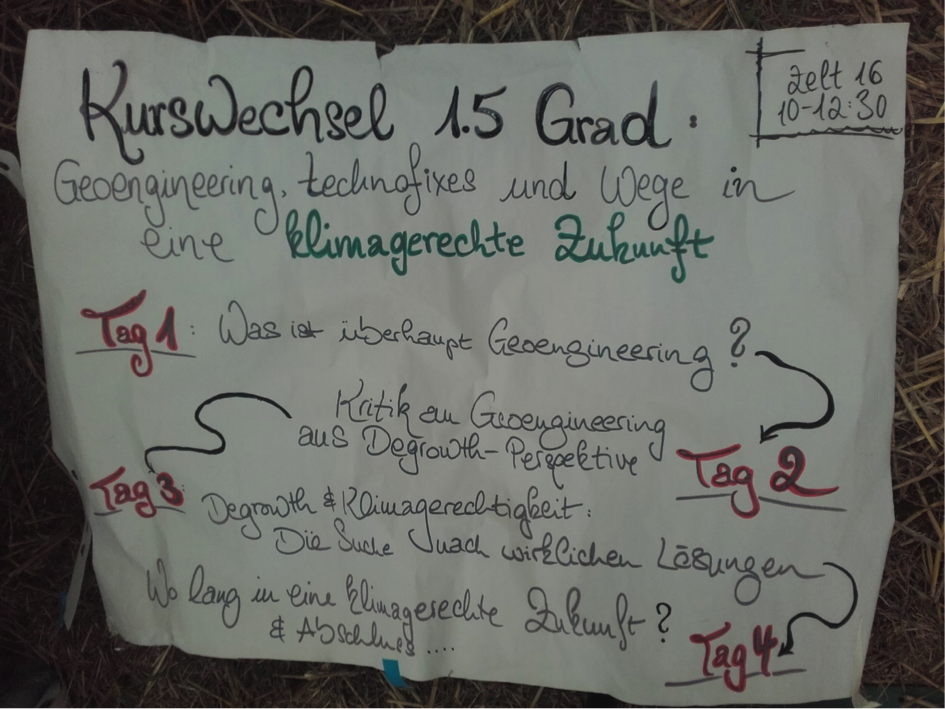Two loose movements have emerged on either side of the Atlantic with the aim of transforming the economy. In the U.S. –the new economy movement and in Europe - the degrowth movement . Both originated as critiques of the current political-economic system, and gained momentum after the financial crisis, since flourishing into nascent social movements composed of practitioners, academics, and activists. They are each loosely organized through informal networks and some organizational apparatus. Both movements convene annual conferences that represent a hybrid of ideas and action. This hyrbidity captures their dual nature, on the one hand as scholarly efforts to analytically critique the political-economic system and think through radical alternativates, and on the other hand as practitioners and activists keen to enact these alternatives through action, organizing, grassroots initiatives, and local politics.
Both movements problematize the status quo for its structural design that regularly produces outcomes that are harmful to both humans and the biophysical world. Thus, both movements call for a deep and systemic transformation of the political-economic system to fundamentally change the functioning of the economy, society, and their relationship to Nature along principles of equity, justice, and care. Surprisingly, there are many similarities between both approaches to transformation, despite the different contexts that they emerged from, including the need to overcome capitalism, perceiving the ecological crises as inter-linked with the social crises, the rejection of economic growth, and the importance of considering strategically how to achieve a systemic transformation. This reflects the common shared experience of hyper-capitalism in two geographically and culturally distinct places, which should come as no surprise, since capitalism is a homogenizing force that spreads relentlessly.
Despite these similarities, there are also noteworthy differences with respect to their specific understanding of transformation, namely (i) the initial problematization, i.e. what needs to change; (ii) what alternative vision is imagined; (iii) what are the obstacles and possibilities to achieve this vision; (iv) how might these obstacles and opportunities change with time; and (v) what is a strategy to actively get towards the vision given points (i)-(iv).
Starting wtih (i), the new economy movement has a greater focus on social and economic issues, e.g. inequality, democratic ownership of productive assets, and community well-being. In contrast, the degrowth movement focuses more on the environmental crises and problematizing Society-Nature relations, e.g. the need to radically reduce throughput, stay within planetary boundaries and re-orient society along a less resource intensive way. While both are clearly advocating for a social-ecological transformation, each starts from a different 'key issue', in the case of degrowth its roots are more firmly in ecological issues and the new economy movement more strongly linked to social issues, but both have a clear understanding that these issues are inter-connected and changing one alone is not adequate. One limit of emphasizing the social-economic crises and accompanied solutions (in the case of the new economy movement) is an under-recognition of the deep embeddedness of society-nature relations. A limit of over-emphasizing the ecological crises (in the case of degrowth) is the risk of alienating many potential allies, such as low income people, a point that will be considered next.
As a result of these two slightly different foci, the other categories were also often filtered through this lens, which resulted in an initial slightly different problematization leading to increasingly different ideas of barriers, potentials and importantly – the subjects for/against a transformation, i.e. who will support this transformation and who will resist it. For example, Gar Alperovitz (a key author of new economy thinking in the U.S.) embraced small businesses for their wealth democratizing characteristic and their emphasis on place and community. In contrast, Giorgos Kallis (a leading degrowth thinker) was more critical of such actors due to their tendency towards profit, accumulation, expansion, and thereby increasing throughput. The limit of the degrowth approach is clearly a lack of potential allies, a point Kallis concedes, whereas the potential of the new economy movement is its broader number of potential allies.
Another contrast is the difference in spatial focus. A recurring emphasis of Alperovitz is that a Pluralist Commonwealth (his concept to distill new economy thinking in a broader theory) is an American vision of transformation, which includes drawing on American values, the American institutional landscape, and American historical experiences when considering pathways, potentials, and barriers for transformation. In contrast, Kallis’ discussion of degrowth is at a higher level of abstraction, often applied to the global North, sometimes referring to the “European degrowth movement”, and occasionally citing specific examples but there is no single focused context. While this lends degrowth to a more globalist perspective that has potentially far greater reach and greater consideration of peoples across places, it falls short in highlighting specific pathways and strategies for transformation due to its de-conxtualized approach.
Notably, the similarities between the two approaches again increased when considering strategy as both drew on Gramsci’s concepts of the state, hegemony, and common senses. This resulted in both authors critiquing the limits of pathways that failed to engage with the state, e.g. small projects and grassroots initiatives. Additionally, both considered ways that these projects and efforts could be a part of a transformational strategy through different forms of mobilization to impact politics and policy. For Alperovitz, the possibility of creating new institutions to displace hegemonic institutions, e.g. new cooperative banks, was a high potential pathway for building power before later building a new transformational political base. Slightly differently, Kallis rather proposed building a movement composed of people in alternative economy practices, to form a new political force, then create policies to further the space of maneuver for these projects, which would in turn increase their number and bring more people to the political force.
In summary, these two approaches to transformation had many similarities in their broader problematization and understanding of the multiple crises, with slightly different foci as described in their ecological (for degrowth) vs social (for new economy) leaning.Surprisingly, with regards to their respective theories of change, both approaches embraced the work of Gramsci and his theory of the state, which led both to emphasize the need for strategies that went beyond tinkering at the margins (e.g. interstitial strategies in the language of Erik Olin Wright). However, with regards to speicifc strategies, the strength of the new economy's explicitly place-based focus became clear, as it could articulate highly context-sensisitive strategies for transformation that built upon historical learnings, specific institutional arrangements, and a deep understanding of the emerging actors in the new economy movement. In contrast, the degrowth movement's consideration of strategy was much more vague which kept its analysis of allies, barriers, institutional-landscape, and political possibilities more superficial. Thus, the degrowth movement would benefit from acknowledging the benefits of greater context-specifity when considering strategy (e.g. by looking at the new economy movement), and the new economy movement would benefit from acknowleding that it sometimes lacks the global perspective that approaches like degrowth offer (emphasizing unequal exchange, deep solidarity, colonial relations, etc). This short summary of two approaches to social ecological transformation in the U.S. and in Europe is the outcome of a Master's thesis that explored this topic in further detail.

Self-limitation is not about constraining, but about defining collectively as societies our limits. Political ecology ‘has made strong arguments against natural limits’ and is in friction with ‘degrowth’s .. urgency of less’, writes Paul Robbins. Indeed, political ecologists developed the field as a response to 1970s neo-Malthusianism. Nancy Peluso, Lyla Mehta or Betsy Hartmann have exposed ...

The arrival of smartphones, self-driving cars and the Cloud are all symptomatic of a profound shift that is re-writing modern society from within: the Fourth Industrial Revolution. New technologies claim to provide answers to a host of problems, but is technology unbound always a force for good? In the first of a three-part series on the Fourth Industrial Revolution, EcoPolítica’s Paz Serra...

Linda Schneider reflects on Geoengineering Monitor about a workshop on geoengineering from a degrowth and climate justice perspective at Degrowth Summer School in Rhineland, Germany: http://www.geoengineeringmonitor.org/2017/09/workshop-geoengineering-from-a-degrowth-and-climate-justice-perspective/ Geoengineering Monitor aims to be a timely source for information and critical perspect...